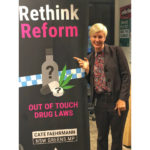Ice Inquiry Makes Recommendations, But Government Has Its Head in the Sand

In its final report, the NSW Special Commission of Inquiry into the Drug “Ice” outlines that the use of methamphetamine and other similar drugs “requires compassionate responses consistent with human rights approaches, rather than punitive responses that can compound the harms of use”.
Delivered to the Berejiklian government on 28 January, the report goes on to make 109 recommendations that thoroughly consider all aspects of the drug issue from increased treatment to harm reduction methods, moving towards a health approach to drugs, and stigma reduction.
However, issued last week, the Berejiklian government’s interim response rules out long-term community wants, including pill testing services, increased safe injecting and consumption rooms, prison needle syringe programs (NSPs), and ditching drug dogs.
Encouragingly, NSW health minister Brad Hazzard said in a 27 February statement that the government will be considering all other recommendations, which include drug decriminalisation, limiting drug-related strip searches, and appointing a drug and alcohol minister.
And while there’s great frustration in the community around the denial of certain harm reduction measures that are desperately needed, one veteran drug law reformer has put this government reluctance down to what might be termed teething issues.
Harm reduction denial
“There is a great similarity between how most individuals respond to their own dysfunctional relationship with mood altering drugs,” Dr Alex Wodak said, “and how communities respond to their dysfunctional policy for mood altering drugs.”
“So, often governments categorically rejecting reform are making the first step to grudgingly accepting reform,” the president of the Australian Drug Law Reform Foundation told Sydney Criminal Lawyers.
And the doctor ought to know. A popup needle and syringe exchange that he and some colleagues illegally set up in Sydney’s Darlinghurst in the mid-80s, led the state government to sanction the roll out of NSPs, which subsequently caught on across the nation.
This act of civil disobedience curbed what would have been a much greater outbreak of HIV in the community. And Dr Wodak was also instrumental in seeing the launch of the first medically supervised injecting centre in Kings Cross, which turned the tide on a local overdose crisis.
“It’s hard to think of any sensible change in drug policy in Australia which was readily and easily accepted. Usually, Herculean efforts are required to even achieve minimal change,” Dr Wodak explained. “But over time, harm reduction policies are well accepted and become mainstream.”
Key community priorities
The recommendations that health minister Hazzard outright rejected involve harm reduction strategies that have been the focus of long-term and very public campaigns calling for their implementation.
Following the deaths of five young people at NSW music festivals over the 2018-19 season, the calls for pill testing reached fever pitch. Although, “Just Say No” NSW premier Gladys Berejiklian has consistently refused to even consider the method stating there’s no evidence to show it works.
The government has also denied the suggestion that pill testing best practice guidelines are developed. This is despite the European Union having produced such guidelines years ago. Indeed, pill testing services started being rolled out in the Netherlands way back in 1992.
Bringing a halt to the use of drug dogs at festivals has also been ruled out, even though it’s widely accepted that the dogs – which get it wrong two-thirds to three-quarters of the time – actually lead young people to partake in dangerous drug taking behaviour that sometimes costs lives.
The Liberal Nationals government is also continuing on with its long standing position on not heeding to calls regarding the establishment of more safe injecting rooms, which it’s now suggested are broadened so as to allow for the consumption of drugs such as ice via pipes.
And while it’s okay for people on the outside to access clean injecting equipment, it will still be denied to inmates. So, not only is government unable to stop drugs in prisons, but neither can it prevent the spread of blood borne diseases within them, which eventually makes it back outside.
Evidence-based suggestions on the table
“The 2019 NSW ‘Ice’ Commission was a systematic, thorough and careful review of the evidence,” Dr Wodak said. “It is hard to understand how any inquiry listening to the evidence presented could have come to different conclusions or made different recommendations.”
The doctor explained that the ice commission investigation comes on the back of numerous drug inquiries over recent decades, which have all understood that the drug war has failed, and that the “punishment-based approach” is only exacerbating drug harms and issues in the community.
“This is the context for the 109 sensible and reasonable recommendations attempting to steer a path to better outcomes for people who use drugs, their families and communities,” he added.
Probably the most significant recommendation that the Berejiklian government has indicated it will consider is the decriminalisation of the personal possession and use of illicit substances, which is a policy that has significantly improved lives in Portugal since it began operating in 2001.
The state government is also going to look at a recommendation to curb the use of traumatic strip searches, so that they’re only used in circumstances where drug supply – not personal possession – is suspected, along with suggesting that NSW police rewrites its strip search guidelines to reflect this.
The global trend
“The Berejiklian government has been consistently refractory to all expert advice regarding the failure and futility of its drug policy,” the doctor made clear. “The short-term prospects of drug law reform and better outcomes in NSW are dismal, but the long-term prospects are excellent.”
The reason being is that drug law reform is “accelerating internationally”. This can be seen most obviously in recent moves to legalise cannabis, as well as in the generally accepted conviction that the war on drugs is producing destructive and inhumane consequences.
As an example, the doctor noted that just this week at a meeting of the International Narcotics Control Board, Norwegian health minister Bent Høie stated that his long-term opposition to drug law reform has been misguided.
“Inevitably at some point, NSW and the rest of Australia will be swept up by this international movement,” Dr Wodak concluded. “Advocacy for reform does have an impact, but social policy reform is always very slow.”







